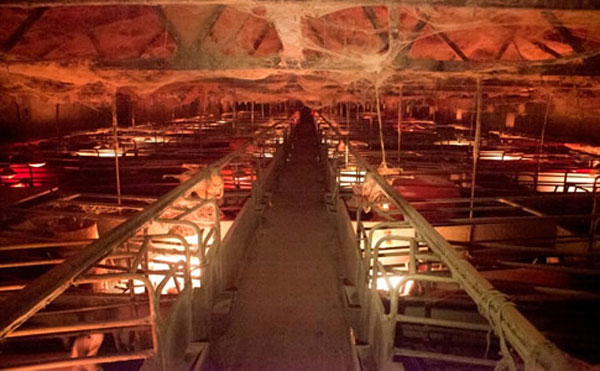Out of sight and out of mind, the Australian meat industry benefits from keeping consumers in the dark about what happens behind the closed doors of factory farms and slaughterhouses.
It is unsurprising then that agricultural lobby groups, including Australian Pork Limited, are currently advocating the introduction of a new set of legislation, termed ‘ag-gag’ laws, that will essentially censor investigations that expose animal welfare abuses in Australian agriculture. It is worrying, however, that several politicians are now adding the laws to their agenda on Capital Hill.
The laws are inspired by legislation already enacted in several states of the US that, under the guise of protecting the welfare of livestock, primarily seek to prohibit evidence of animal cruelty and malpractice being brought to the attention of the media and the general public.
In Australia, undercover footage of animal abuse in factory farms is the main modus operandi of activists, such as Animal Liberation, who have exposed the horrific conditions of 15 piggeries and led to the closure of two, including the controversial Wally’s Piggery that sparked public outrage in 2012.

But although these tactics are illegal, publishing the material is entirely aboveboard. UNSW law academic Tara Ward points to a case in 2011 where the High Court ruled that the ABC be permitted to broadcast undercover footage obtained from inside the slaughtering facility of a possum abattoir.
Meanwhile, Emma Davies of the Animal Defenders Office ACT explained that the footage, even if illegally obtained, can also be accepted as evidence in a criminal trial.
“Trespassing is an offence in itself, which means entering private property without permission to record activities may attract criminal and civil liability,” Davies said. “The use and/or installation of audio or visual surveillance devices may, however, amount to an offence in itself in some jurisdictions, such as NSW, even if it does not involve trespass.
“It is also important to note that courts may permit surveillance materials to be admitted as evidence in criminal proceedings, even if it was obtained by unlawful means.”
As such, a key feature of the ‘ag-gag’ laws being considered in Australia is the requirement that all footage of animal abuse in factory farms be turned over to police and relevant authorities within, at most, 48-hours. All evidence must be turned over, none of which can be given to the media or published by any other means.
Western Australia Senator Chris Back is an outspoken supporter of ‘ag-gag’ laws and argues that the provisions allow appropriate authorities to immediately investigate breaches of conduct, instead of footage being exploited to misinform the public and fuel inflammatory campaigns. In particular, he compares activists’ tactics to withholding evidence of child molestation.
“Any person with a keen interest in animal welfare, if they came upon information or vision that appeared to be of undue cruelty to animals, there should be no motivation for them to do anything other than present that material to authorities as quickly as possible, to have the issue addressed,” Back told The Australian Dairyfarmer last July.
“It would be unacceptable to the community that any person would withhold that footage for any length of time, for whatever the purpose, before they made it public.”
But opponents to ‘ag-gag’ laws see things differently. US journalist and author Will Potter specialises in animal rights and environmental movements, and presented a lecture series around Australia throughout May to raise awareness of the danger of ‘ag-gag’ laws, using the experience of the US as a dire warning.
“By eliminating that release to the media, it prevents the public and consumers from knowing what’s happening, which is the point of these ‘ag-gag’ laws,” Potter explained.
“But also turning over that footage so quickly is an attempt by the industry to say an incident is just an isolated case, rather than allowing an investigation to be built over a period of weeks or months. This way, they can pretend that it’s just a few bad apples, a few bad workers, rather than taking proper responsibility.”
Animal Liberation fights for the right of the Australian public to make up its own mind regarding the treatment and welfare of livestock.
“The public has a right to know what is happening to animals raised in factory farms. The industry knows as well as we do that if the general public become aware of their practices… they would be condemned by much of the Australian public,” Clare Atkinson of Animal Liberation ACT said.
“In regards to these matters being resolved by the police, much of the cruelty and abuse shown in footage is completely legal and considered standard industry practice. However when incidents occur that are illegal Animal Liberation ACT will refer footage on to the authorities, as was done in the case of Wally’s Piggery in 2012.”
The Australian public has a fundamental right to know how the food we consume ends up on our plate, a right that is being threatened by the proposed ‘ag-gag’ laws that purposefully keep consumers unaware, while strangling open and transparent debate and discussion.
While pressure from consumers and retailers can force much needed change within the industry, such as the phasing out of sow stalls, as long as footage is withheld, the public is kept clueless and it is ‘business as usual and as brutal’ for the meat industry, profits unharmed.
Donate To New Matilda
New Matilda is a small, independent media outlet. We survive through reader contributions, and never losing a lawsuit. If you got something from this article, giving something back helps us to continue speaking truth to power. Every little bit counts.



